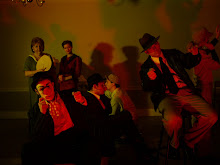In Red Tape’s adaptation of The Dog in the Manger the Countess Diana’s chief suitor has been re-imagined as a member of the Spanish Inquisition whose influence in society is waning. The Inquisitors included laymen as well as clergy among their ranks so the scenario is not unthinkable. Though the Inquisition was still in power in Lope de Vega’s lifetime it grew unpopular when Spain’s economy began to sink.
In 15th Century Spain the Catholic Monarchs, Ferdinand and Isabel, sought to unite the regions of Portugal, Castille and Aragon, by declaring Christianity the dominant religion. Thousands of citizens “voluntarily” converted to keep their place in society. In 1478 the Monarchs established the Inquisition to investigate these conversos. By 1492 the Jews were officially expelled from all regions of Spain. The elimination of the Jewish middle class and the opening of American territories allowed the fortunes of the nobility to climb as Spain entered a Golden Age.
The Arts thrived in the economy of 16th Century Spain. Meanwhile the Inquisition proceeded to cut Spain off from all foreigners. Historian Henry Kamen writes that “Thereafter the closed society found that it had exhausted its own resources… The disappearance of the Jews and the persecution of the conversos created a void in the world of capital which was never satisfactorily filled by Spaniards. ” (The Spanish Inquisition, New American Library, 1965).
By the 19th Century the Golden Age had long since ended and the Inquisition had fallen out of favor. Spain’s military losses to France and England, and a failed attempt at a republic, had injured the economy. Spain’s parliament, the Cortes, saw the Inquisition as an obstacle to the countries reformation and began to cut off authority and finances. Personnel shrunk as inquisitors complained of unpaid wages. Their last official execution for heresy was recorded in 1825. Kamen writes “a formal decree was eventually issued on 15 July 1834 by which the Inquisition was definitively suppressed, all its properties and canonries applied to the extinction of public debt, and just payment of salaries made to all its formal officials.” By this point the Inquisition’s influence was so small that the decree was considered “little more than a formality.”
Paul G. Miller
Season Dramaturge
For more information on The Dog in the Manger click here: http://www.redtapetheatre.org/.
Subscribe to:
Post Comments (Atom)


No comments:
Post a Comment